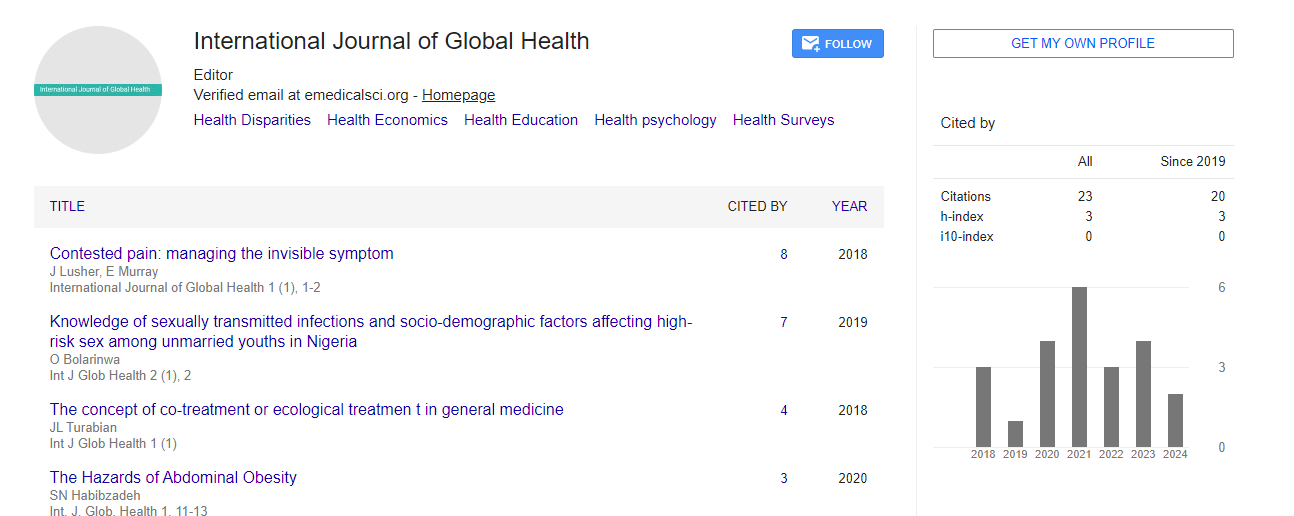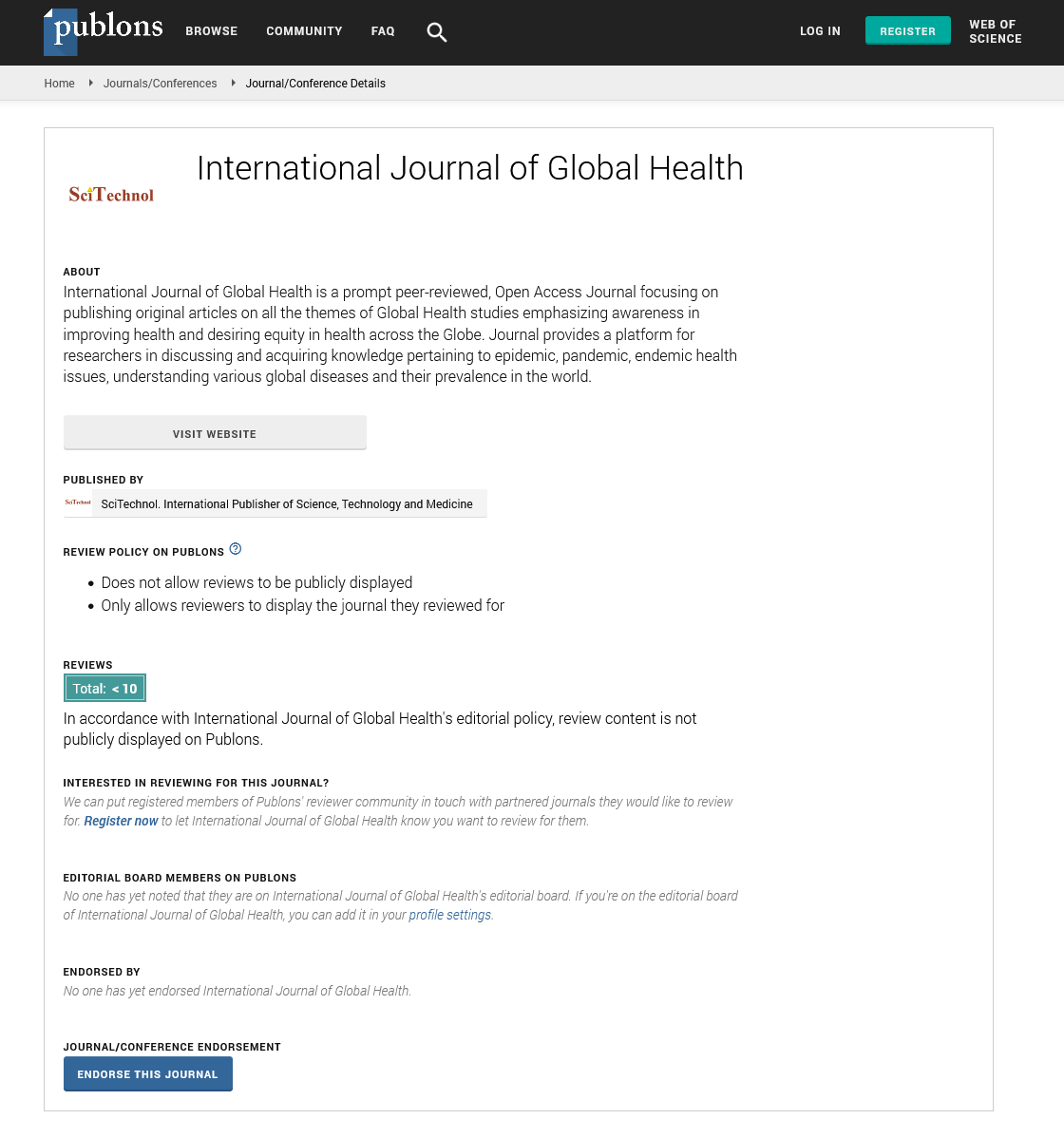Short Communication, Int J Glob Health Vol: 7 Issue: 3
Ethics in Translational Medicine: Balancing Innovation and Patient Safety
Nora Hangel*
1Department of Medicine, University of Munich, Munich, Germany
*Corresponding Author: Nora Hangel,
Department of Medicine, University of
Munich, Munich, Germany
E-mail: nora.hangel@tu.de
Received date: 26 August, 2024, Manuscript No. IJGH-24-148996;
Editor assigned date: 28 August, 2024, PreQC No. IJGH-24-148996 (PQ);
Reviewed date: 11 September, 2024, QC No. IJGH-24-148996;
Revised date: 18 September, 2024, Manuscript No. IJGH-24-148996 (R);
Published date: 25 September, 2024, DOI: 10.4172/Ijgh.1000214.
Citation: Hangel N (2024) Ethics in Translational Medicine: Balancing Innovation and Patient Safety. Int J Glob Health 7:3.
Abstract
Description
Translational medicine is an interdisciplinary field that aims to translate scientific discoveries made in the laboratory into effective therapies and clinical practices for patients. By facilitating the movement of knowledge from bench to bedside, translational medicine seeks to improve health outcomes and enhance the efficiency of the healthcare system. This study discovers the principles of translational medicine, its significance in contemporary healthcare and the challenges and future directions of this evolving discipline [1]. Benchto- Bedside Approach emphasizes the direct application of laboratory research findings to clinical practice. Researchers and clinicians collaborate to ensure that scientific advancements can be effectively implemented in patient care. Translational medicine prioritizes patient needs, involving them in the research process. This approach enhances the relevance of research questions and ensures that outcomes align with patient priorities [2]. Successful translational research requires collaboration among various disciplines, including basic science, clinical research, epidemiology, pharmacology and public health. This interdisciplinary framework promoting innovation and accelerates the development of new treatments. Translational medicine incorporates continuous feedback from clinical practice into research. Clinicians provide insights about treatment effectiveness and patient outcomes, which can inform and refine research directions [3].
Significance of translational medicine
Translational medicine plays a vital role in accelerating the drug development process. Traditional drug development often takes over a decade and can be prohibitively expensive. By applying a translational approach, researchers can identify promising therapeutic targets more efficiently, design clinical trials that better reflect patient populations and expedite the regulatory approval process [4]. For example, the use of biomarkers in clinical trials can help identify the right patient populations for targeted therapies, increasing the likelihood of success. The field of precision medicine, which tailors treatments to individual patient characteristics, benefits significantly from translational research. Understanding the genetic, environmental and lifestyle factors that contribute to diseases enables the development of personalized treatment strategies [5]. Translational medicine facilitates the identification of genetic mutations and biomarkers that can guide therapy selection, ultimately leading to better patient outcomes. For instance, the identification of specific mutations in cancers has led to targeted therapies that significantly improve survival rates. By integrating research and clinical practice, translational medicine has the potential to improve patient outcomes [6]. New treatments can be developed and tested rapidly, ensuring that patients have access to the latest therapeutic options. Furthermore, translational research promotes evidence-based practices, allowing healthcare providers to implement the most effective interventions based on the latest scientific evidence. Translational medicine also aims to address health disparities by ensuring that research includes diverse populations [7]. This inclusivity helps to identify variations in disease presentation, treatment response and outcomes among different demographic groups. By understanding these differences, translational researchers can develop more effective interventions tailored to the specific needs of unrecognised populations.
Challenges in translational medicine
Securing funding for translational research can be difficult. Many funding agencies prioritize basic research, leaving a gap in financial support for studies that bridge laboratory discoveries and clinical applications. Additionally, resource limitations may hinder the ability to conduct comprehensive translational studies. The regulatory landscape for new therapies can be complex and time-consuming [8]. Navigating the approval processes set by regulatory bodies, such as the FDA, requires extensive documentation and evidence of safety and efficacy. These regulatory hurdles can slow the pace of translational research and limit the availability of new treatments. While interdisciplinary collaboration is essential for successful translational medicine, it can be challenging to promoting effective communication and cooperation among researchers [9], clinicians and industry partners. Differences in terminology, priorities and methodologies can generate barriers to collaboration, hindering the progress of translational research. Translational research often involves human subjects, raising ethical concerns regarding informed consent, patient safety and the use of experimental therapies. Researchers must navigate these ethical considerations carefully to ensure that patient rights and welfare are protected throughout the research process [10].
Conclusion
Translational medicine represents a vital approach to bridging the gap between scientific discovery and clinical application. By prioritizing patient-centered research, promoting interdisciplinary collaboration and addressing the challenges that impede progress, translational medicine has the potential to revolutionize healthcare. As we continue to advance our understanding of diseases and develop new therapies, the principles of translational medicine will be essential in ensuring that these advancements translate into meaningful benefits for patients and the healthcare system as a whole.
References
- Juffermans NP, Gözden T, Brohi K, Davenport R, Acke et al. (2024) Transforming research to improve therapies for trauma in the twenty-first century. Crit Care 28(1):45.
- Hardy A, Keen N, van den Berg D, Varese F, Longden E et al. (2024) Trauma therapies for psychosis: A state‐of‐the‐art review. Psychol Psychother 97(1):74-90.
- Yan A, Torpey A, Morrisroe E, Andraous W, Costa A, et al. (2024) Clinical management in traumatic brain injury. Biomedicines 12(4):781.
- Tempone Wiltshire J (2024) The role of mindfulness and embodiment in group-based trauma treatment. Psycho Coun J Aus 12(1).
- Gjerstad SF, Nordin L, Poulsen S, Spadaro EF, Palic S (2024) How is trauma-focused therapy experienced by adults with PTSD? A systematic review of qualitative studies. BMC Psychol 12(1):135.
- Messer EP, Eismann EA, Folger AT, Grass A, Bemerer J, et al. (2024) Comparative effectiveness of parent–child interaction therapy based on trauma exposure and attrition. Psychol Trauma 16(S1):S97.
[Crossref] [Google Scholar][Pubmed]
- Karunarathna I, Gunawardana K, Aluthge P, Jayawardana A (2024) Innovative therapies and future directions in pulmonary hemorrhage management.
- Romier A, Clerici E, Stern E, Maruani J, Geoffroy PA. (2024) Therapeutic Management of Nightmares: Practice Guide for Imagery Rehearsal Therapy (IRT). Curr Sleep Med Rep 15:1-6.
- Coppalini G, Salvagno M, Peluso L, Bogossian EG, Quispe (2024) Cardiac injury after traumatic brain injury: clinical consequences and management. Neurocrit Care 40(2):477-485.
- Millot F, Endomba FT, Forestier N. (2024) Light Therapy in Post-Traumatic Stress Disorder: A Systematic Review of Interventional Studies. J Clin Med 13(13):3926.
 Spanish
Spanish  Chinese
Chinese  Russian
Russian  German
German  French
French  Japanese
Japanese  Portuguese
Portuguese  Hindi
Hindi 
